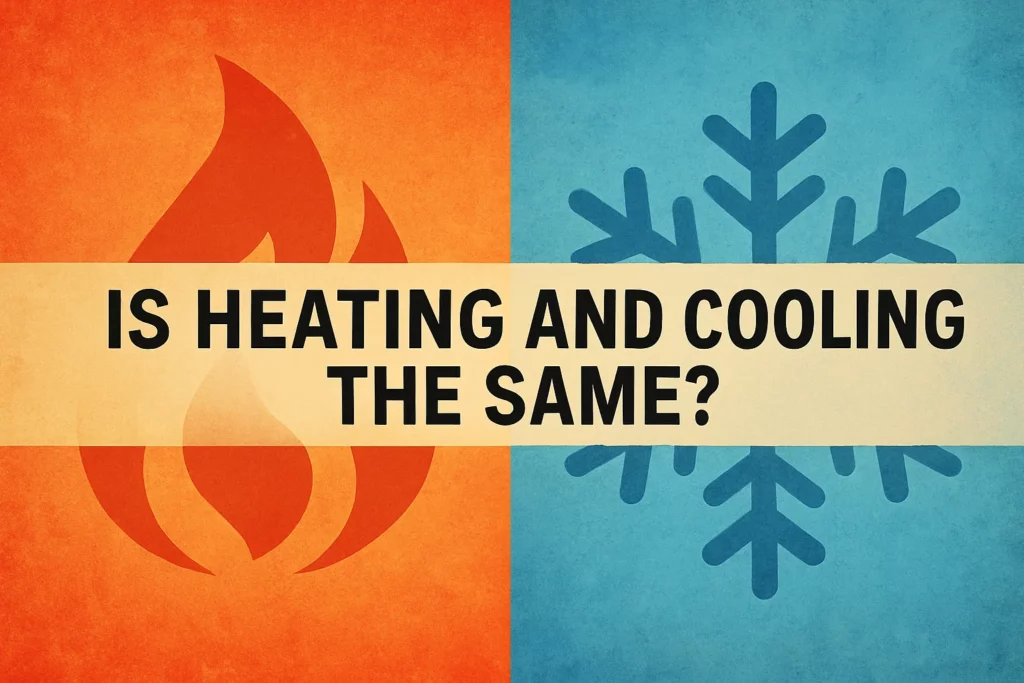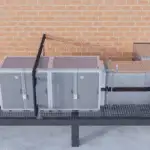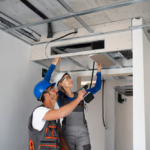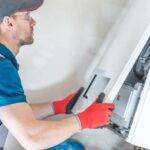Understanding HVAC systems is key to a comfy home. You want to Stay Cool. Breathe Easy. Live in High Comfort. But is heating and cooling really the same?
Exploring heating and cooling systems shows they’re not exactly the same. They have some similarities but different main jobs. The best HVAC solutions ensure your home is always just right, all year.
Key Takeaways
- Knowing HVAC basics is vital for home comfort.
- Heating and cooling systems have different main jobs, despite some similarities.
- Top-tier HVAC solutions give you peace of mind and comfort all year.
- Getting installations and repairs right is key for HVAC to work best.
- HVAC systems are essential for a comfy home environment.
Understanding HVAC Basics
Your home’s comfort and livability depend a lot on its HVAC system. It’s key to know how these systems work.
What Does HVAC Stand For?
HVAC means Heating, Ventilation, and Air Conditioning. It’s a system that controls your home’s temperature, humidity, and air quality. This ensures your home is comfortable all year round.
The Components of a Complete HVAC System
An HVAC system has several important parts. These include a heating unit, cooling unit, ductwork, thermostat, and ventilation system. Each part is essential for keeping your home comfortable.
The heating unit keeps your home warm in cold months. The cooling unit cools it in hot months. Ductwork spreads the heated or cooled air everywhere. The thermostat controls the temperature.
Good ventilation removes stale air and brings in fresh air. This improves the air quality in your home.
How HVAC Systems Affect Your Home Comfort
HVAC systems greatly affect your home comfort by controlling the indoor climate. A well-kept system keeps temperatures and humidity levels steady. It also improves air quality by reducing allergens and pollutants.
Knowing how your HVAC system works helps you make it better. This way, your home stays a cozy place. “Stay Cool. Breathe Easy. Live in High Comfort” is more than a slogan. It’s what a good HVAC system can make your home.
Is Heating and Cooling the Same Thing?
Many people wonder if heating and cooling are the same. Knowing the answer can make your home more comfortable and efficient. Let’s look at what each process does.
Defining Heating and Cooling Processes
Heating and cooling are two important processes for a comfy home. Heating makes your home warm when it’s cold. Cooling makes it cool when it’s hot. Both are key for a comfortable indoor climate. Read more: How to maintain heating and cooling systems?
- Heating systems create warmth, often through burning fuel or electricity.
- Cooling systems take heat out of the air and move it outside.
Shared Components vs. Distinct Functions
Heating and cooling share some parts, like ductwork and vents. But, they have different main jobs. Heating adds warmth, while cooling takes it away.
Some main differences are:
- Heating adds heat, while cooling takes it away.
- Heating uses furnaces and boilers, while cooling uses air conditioners and heat pumps.
Why Understanding the Difference Matters for Your Home
Knowing the difference between heating and cooling is key for your HVAC system. It helps you take care of it, fix problems, and choose the right upgrades. This knowledge also shows how complex your HVAC system is and why regular checks are important.
Get the best HVAC solutions for your peace of mind. By understanding your heating and cooling systems, you can keep your home comfy all year. And you’ll save on energy costs too.
How Heating Systems Work
Learning about heating systems helps you choose the best for your home. They keep your home warm and cozy, mainly when it’s cold outside.
Common Types of Heating Systems
There are many heating systems, each with its own strengths. Here are a few:
- Furnaces: These are very common. They use gas, propane, or electricity to warm the air, which then spreads through your home.
- Boilers: Boilers warm water or steam. This warm liquid or gas is sent through radiators or underfloor heating to warm your home.
- Heat Pumps: Heat pumps move heat from one place to another. They can heat and cool your home by changing the direction of heat flow.
The Heat Generation Process
How heat is made differs by system. For example, furnaces burn fuel to warm air. Boilers heat water or steam. Heat pumps use refrigeration to move heat.
Distribution Methods for Heated Air
After heat is made, it must be spread around your home. Systems use ductwork for furnaces, radiators for boilers, and air handlers for heat pumps.
Keeping your heating system in good shape is key. It makes sure your home is always comfortable, no matter the season.
How Cooling Systems Work
As the temperature goes up, knowing how cooling systems work is key to a comfy home. These systems take heat out of your home, making it cooler inside.
Common Types of Cooling Systems
There are many cooling systems out there, each with its own perks and features.
Central Air Conditioners
Central air conditioners are a top pick for cooling homes. They cool air and send it through ducts and vents.
Heat Pumps in Cooling Mode
Heat pumps can cool your home too. They move heat outside, making your home cooler.
Ductless Mini-Splits
Ductless mini-splits are great for cooling specific rooms. They don’t need ductwork, making them flexible.
The Heat Removal Process
The process of removing heat involves moving it from inside to outside. This is done with refrigerants that take in heat and let it out outside.
How Cooled Air Circulates in Your Home
Cooled air moves through ducts and vents in your home. Ductless mini-splits cool air directly in the room.
| Type of Cooling System | Description | Efficiency |
| Central Air Conditioners | Circulates cooled air through ducts | High |
| Heat Pumps | Transfers heat outside | High |
| Ductless Mini-Splits | Directly cools specific areas | Very High |
Keep cool and comfy with the right cooling system for your home. Whether it’s central air, heat pumps, or ductless mini-splits, knowing how they work helps you choose wisely.
Integrated Systems: When Heating and Cooling Work Together
Using one system for both heating and cooling is the new way to keep your home comfortable. It makes controlling the climate easier and more efficient. Let’s explore how these systems work together.
Dual-Function Equipment
Dual-function equipment, like heat pumps, can both warm and cool your home. These systems extract heat from the outside air, even when it’s cold. They move this heat inside during winter. In summer, they cool your home by reversing this process.
Shared Ductwork and Ventilation
Integrated HVAC systems use shared ductwork and ventilation to spread heated and cooled air. This method can make installation easier and cut down costs.
Smart Thermostats and Control Systems
Smart thermostats are key in managing these systems. They let you precisely control the temperature in your home, often through apps on your phone. Some systems even learn your habits to save energy.
Energy Efficiency Benefits of Integrated Systems
Integrated HVAC systems have many energy-saving perks, including:
- Less energy use thanks to better heating and cooling cycles
- Lower bills because the system is more efficient
- Chances for rebates and tax breaks
Choosing an integrated HVAC system means a more comfy home and a smaller environmental impact.
Cost Comparison of Different HVAC Options
When looking at HVAC systems for your home, knowing the costs is key. The total cost includes many factors that can change your budget a lot.
Initial Installation Expenses
The cost to start with an HVAC system varies a lot. A high-efficiency heat pump might cost more than a standard one. The size of your home and how hard it is to install also play a part.
Long-term Operating Costs
After you buy the system, how much it costs to run it matters a lot. Energy-efficient systems might cost more at first but save you money later. For example, a high SEER rating can cut down on cooling costs in summer.
Return on Investment for Energy-Efficient Models
Choosing an energy-efficient HVAC system can save you a lot on bills. The U.S. Department of Energy says you could save 20% to 50% on energy costs. This means saving hundreds or thousands over the system’s life.
Potential Rebates and Tax Incentives
Many places offer rebates and tax breaks for energy-efficient HVACs. These can help lower the cost of these systems. For example, the Residential Renewable Energy Tax Credit can give you a tax break for certain systems.
- Check with your local utility company for available rebates.
- Consult with a tax professional to understand the tax incentives you may be eligible for.
- Research government programs that support energy-efficient home upgrades.
Think about both the upfront costs and long-term savings to choose wisely. This way, you can find a system that fits your budget and keeps you comfortable.
Choosing the Right HVAC System for Your Home
Choosing the right HVAC system is key for comfort and efficiency. You need to think about several factors. These factors affect how well the system works for your home.
Assessing Your Climate and Regional Needs
Your local climate is important for picking an HVAC system. Homes in cold areas need strong heaters, while warm areas need good coolers. Knowing your climate helps pick the right system for your home’s temperature.
Evaluating Your Home’s Size and Layout
The size and layout of your home matter a lot. A system that’s too small won’t heat or cool well. One that’s too big is wasteful and expensive. Experts can do a Manual J calculation to find the right size for your home.
Energy Efficiency Ratings Explained
Energy efficiency ratings, like SEER and AFUE, are key. They show how well a system works, with higher numbers being better. Knowing these ratings helps you pick a system that saves money and is good for the planet.
Modern HVAC Technologies and Features
Today’s HVAC systems have cool tech like smart thermostats and zoning systems. These features let you control your home’s temperature better. This can save a lot of energy.
Environmental Impact Considerations
Think about the environment when picking an HVAC system. Look for systems with eco-friendly refrigerants and those that work well with green energy. Choosing wisely can help the planet and save you money.
By looking at these factors, you can find an HVAC system that’s perfect for your home. It should keep you comfortable and meet your energy and environmental goals. Getting the right system is important for a cozy home all year.
Maintenance and Care for Your HVAC System
To breathe easy, keeping your HVAC system in check is key. Regular upkeep makes sure it works well and lasts longer. It also saves you from expensive fixes later on.
Seasonal Maintenance Checklist
Seasonal checks on your HVAC system are a must. They help spot issues early, before they get big. Here’s a simple checklist:
- Before summer: Clean the air filters, check the condenser coils, and make sure air flows well around the outdoor unit.
- Before winter: Look over the heating parts, check for gas leaks if you have a gas furnace, and make sure your thermostat works right.
- Spring and fall: Check the electrical connections, oil moving parts if needed, and look for ductwork leaks or damage.
DIY Maintenance Tasks
There are many DIY maintenance tasks to keep your HVAC system running smoothly. These include:
- Changing air filters often to boost efficiency and air quality.
- Keeping the outdoor unit area clean of debris and plants.
- Adjusting your thermostat to save energy.
When to Schedule Professional Service
While DIY tasks are helpful, sometimes you need a pro. Call for professional HVAC service if you hear odd noises, notice a drop in performance, or it’s been over a year for a check-up.
Extending the Lifespan of Your HVAC Equipment
Regular maintenance is the secret to a long-lasting HVAC system. Using a programmable thermostat, sealing duct leaks, and choosing energy-efficient models also helps. Here’s a quick look at how long different parts last:
| Component | Average Lifespan |
| Air Conditioning Unit | 15-20 years |
| Furnace | 15-30 years |
| Heat Pump | 10-15 years |
By sticking to these maintenance tips and knowing when to get professional HVAC service, your system will run smoothly for years.
Conclusion
Understanding HVAC systems is key to keeping your home comfortable. Knowing the difference between heating and cooling helps you make better choices for your home’s climate control.
A good HVAC system makes your home better and saves energy and money. You’ve learned that systems that do both heating and cooling are great. They’re easy to install and use.
Keeping your HVAC system in top shape is important. Regular maintenance and quick fixes help your equipment last longer. This keeps your home comfortable.
Choosing the right HVAC system and taking care of it means you’ll enjoy a comfortable home all year. A well-designed HVAC system is vital for your home’s comfort.
FAQ
What does HVAC stand for?
HVAC stands for Heating, Ventilation, and Air Conditioning. It refers to systems that control temperature, humidity, and air quality in buildings.
How often should I replace my HVAC system?
HVAC system lifespan varies by type, usage, and maintenance. Furnaces last 15-20 years, air conditioners 10-15 years, and heat pumps 10-15 years. Replace it when it’s not efficient or repair costs are too high.
What are the benefits of a ductless mini-split system?
Ductless mini-split systems are energy-efficient and improve air quality. They heat and cool specific areas and are quiet and attractive.
How can I improve the energy efficiency of my HVAC system?
Improve energy efficiency with regular maintenance. Change filters, clean ducts, and use a smart thermostat. Proper insulation and sealing also help.
What is the difference between a furnace and a boiler?
Furnaces heat air, while boilers heat water for steam or hot water. Furnaces are common in the U.S., while boilers are used in certain areas or for specific needs.
Can I use my heat pump for both heating and cooling?
Yes, heat pumps can heat and cool by reversing refrigerant flow. They’re efficient and cost-effective for moderate climates.
How do I choose the right size HVAC system for my home?
Determine your home’s heating and cooling needs. Consider square footage, insulation, windows, and climate. A professional can help find the right size and type for you.
What are the advantages of a smart thermostat?
Smart thermostats learn your preferences and adjust temperatures automatically. They offer energy insights, improving efficiency and comfort.
How can I maintain my HVAC system to extend its lifespan?
Regular maintenance is essential. Change filters, clean coils, inspect ducts, and schedule tune-ups. This ensures your system works well for years.




